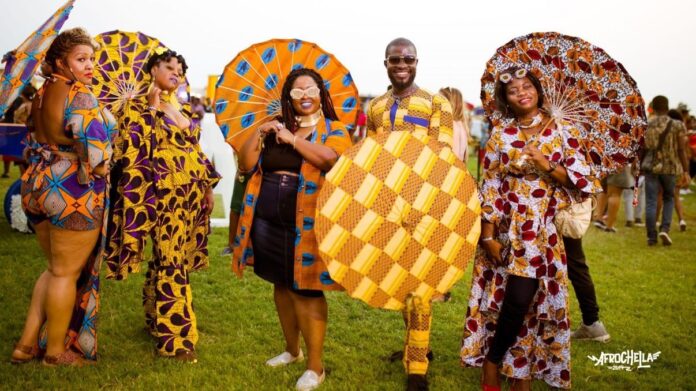A recent article by Afrifah, M., and Mensah, J. (2023) titled “Diaspora tourism and homeland development: exploring the impacts of African American tourists on the livelihoods of local traders in Southern Ghana” published in African Geographical Review by ResearchGate shows that African American tourists are among the major buyers of handicrafts in Ghana, but their numbers and expenditures have declined over the years.
This article explores how African American tourists who visit Ghana to connect with their ancestral roots impact the livelihoods of local traders who sell handicrafts and souvenirs. The study identifies the types of handicrafts that are produced and consumed by African American tourists, such as beaded jewelry, Kente and adinkra fabrics, and woodcarvings. It also examines the sources and supply chains of these handicrafts, which involve local and international markets. The article further explores how much and how often African American tourists spend on handicrafts and how they bargain and negotiate with the sellers. It also discusses how the craft traders use their incomes to sustain their households and businesses. The authors assess how tour operators affect the expenditure of African American tourists and the selection of craft sellers.
“
African American tourist numbers decline, influencing craft markets in Ghana; tour operators wield significant power in shaping tourist experiences.– Afrifah and Mensah 2023
How Tour Operators Affect the Expenditure of African American Tourists
The authors explore that tour operators affect the expenditure of African American tourists and the selection of craft sellers in the following ways:
Tour operators have the power to choose which craft markets and sellers to visit or avoid, based on their preferences, relationships, and quality of products. This can influence the demand and income of certain craft sellers over others.
Tour operators can also negotiate prices and discounts with craft sellers on behalf of the tourists, which can affect the profitability and competitiveness of the craft sellers.
Tour operators can educate and inform the tourists about the history, meaning, and value of the craft products, which can influence the interest and willingness of the tourists to buy them.
Tour operators can facilitate the transportation and delivery of craft products to tourists, which can enhance the convenience and satisfaction of the tourists and the reputation and loyalty of the craft sellers.
How the Study was Conducted
The study employed a qualitative research approach, entailing semi-structured in-depth interviews, observations, informal interactions, and a focus group discussion. This triangulation strategy enhanced the validity and reliability of the data. Acknowledging the positionality of the researcher also helped improve the reliability of a qualitative study. The study focused on five tourist centres in three regions of the country, including Accra, the national capital in the Greater Accra Region; Koforidua and Odumasi-Krobo in the Eastern Region; and Elmina and Cape Coast in the Central Region. These centres are in the southern half of the country and have significant attractions for African-American tourists, such as the slave castles, the Kwame Nkrumah Mausoleum, and the bead markets. The study participants included local handicraft traders, tour operators, African-American tourists, and tourism officials, all of whom were selected using a combination of purposive and snowball sampling procedures. Of the 226 participants, the majority (164) were handicraft traders, followed by tourists (47), tour operators (11), and tourism officials (4). The fieldwork took place in 2013–14, over six months, spanning the peak seasons for diaspora tourism in Ghana. Emergent themes from the data were grouped and re-grouped based on discernible relationships, patterns, and themes, which were then coded to facilitate the data analysis.
What the authors found
The study found that African-American tourists are among the major buyers of handicrafts in Ghana, but their numbers and expenditures have declined over the years. The study also found that they have become more savvy and frugal in bargaining for the best prices in the craft markets.
The authors reveal that the craft trade is not very lucrative for most traders, especially in the off-peak seasons, and that they have to reinvest most of their earnings into their businesses and other basic needs. The study also shows that the supply chain of handicrafts is complex and involves local and international sources.
The authors show that tour operators play a significant role in shaping the tourist experience and spending in Ghana, as they have the power to select, exclude, or promote certain destinations and products. The study also notes that some tour operators may engage in nepotism or favouritism in favour of certain craft sellers.
Why is this Important
The study provides empirical evidence on how diaspora tourism can generate economic opportunities and challenges for local communities in the host country. It also shows how African American tourists seek to connect with their ancestral roots through purchasing and wearing Ghanaian crafts, and how local traders cater to their preferences and expectations. It identifies popular Ghanaian handicrafts that are produced for African-American tourists and examines their spending patterns and income use.
What the Authors Recommend
- The authors suggest that more studies are needed to explore the impacts of diaspora tourism on different aspects of development, such as education, health, infrastructure, and environment, in various African countries.
- The authors argue that diaspora tourism can create opportunities for dialogue and collaboration between the African diaspora and the continent and enhance the sense of belonging and identity among both groups.
- The study also suggests that local traders can improve their income and skills by developing more innovative and authentic handicrafts, forming cooperatives and networks, and accessing training and support from government and non-governmental organizations.
- In addition, the authors also recommend that the government and other stakeholders should ensure that diaspora tourism is sustainable and inclusive and that it respects the rights and interests of local people and the environment.
In conclusion, this study sheds light on the intricate dynamics of diaspora tourism, emphasizing the role of African-American tourists in the handicraft trade within Ghana. While the findings highlight the decline in numbers and expenditures of these tourists over the years, they also underscore the resilience and adaptability of local traders. The influence of tour operators emerges as a crucial factor in shaping the tourist experience and impacting the livelihoods of craft sellers. The intricate web of bargaining, supply chains, and the overall economic intricacies of the handicraft trade in Ghana presents a complex yet compelling narrative. As we navigate the multifaceted landscape of diaspora tourism and its effects on local economies, this research provides valuable insights for stakeholders and policymakers aiming to sustain and enhance the mutually beneficial relationship between African-American tourists and the vibrant craft markets of Southern Ghana.
Cite this article as (APA format):
AR Managing Editor (2023). Diaspora Tourism Impact: African American Tourists and Handicraft Trade in Ghana. Retrieved from https://www.africanresearchers.org/diaspora-tourism-impact-african-american-tourists-and-handicraft-trade-in-ghana/






 The African Research (AR) Index is a comprehensive scholarly directory and database focused explicitly on journal publishers that publish and disseminate African research.
The African Research (AR) Index is a comprehensive scholarly directory and database focused explicitly on journal publishers that publish and disseminate African research.

